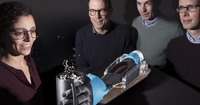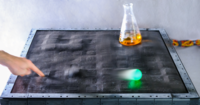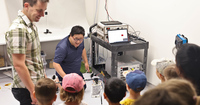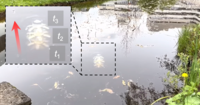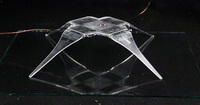News & Awards
Robotic Materials
News
06-03-2025
Artificial Muscles for Tremor Suppression
Scientists at the Max Planck Institute for Intelligent Systems, the University of Tübingen and the University of Stuttgart under the Bionic Intelligence Tübingen Stuttgart (BITS) collaboration developed a biorobotic arm that can mirror human tremors, such as those experienced by individuals that live with Parkinson's disease. Artificial muscles on either side of the forearm contract and relax to suppress the involuntary shaking of the wrist and hand. The researchers see their biorobotic arm not only as a platform for other scientists in the field to test new ideas in exoskeleton technology. The arm also serves as a test bed to see how well artificial muscles known as HASELs can one day become the building blocks of wearable devices. The vision is to one day develop a sleeve that tremor patients can comfortably wear to be able to better cope with everyday tasks such as holding a cup.
Alona Shagan
Christoph Keplinger
Haptic Intelligence
Robotic Materials
Press Release
07-01-2025
Electrohydraulic Wearable Devices Create Unprecedented Haptic Sensations
Scientists at the Max Planck Institute for Intelligent Systems invented compact wearable devices that deliver rich, expressive, and pleasant tactile sensations that go far beyond the buzzing vibrations of today’s consumer devices. The team just published their findings in Advanced Science.
Natalia Sanchez-Tamayo
Zachary Yoder
Philipp Rothemund
Giulia Ballardini
Christoph Keplinger
Katherine J. Kuchenbecker
Robotic Materials
Organizational Leadership and Diversity
News
12-12-2024
Diversity and inclusion accelerate the pace of innovation in robotics
Diverse and inclusive teams are not merely a moral imperative but also a catalyst for scientific excellence in robotics, scientists from the Max Planck Institute for Intelligent Systems point out in a study. The team now published an article in which they outline how a scientific community can benefit if its leadership fosters an environment of diversity and inclusion, and propose a leadership guide for roboticists to help reap these benefits.
Daniela Macari
Ksenia Keplinger
Christoph Keplinger
Robotic Materials
News
18-09-2024
Hexagonal electrohydraulic modules shape-shift into versatile robots
Researchers at the Max Planck Institute for Intelligent Systems in Stuttgart combined soft artificial muscles with a rigid, magnetic exoskeleton to create building blocks for fast-moving reconfigurable robots.
Ellen Rumley
Zachary Yoder
Ingemar Schmidt
Philipp Rothemund
Christoph Keplinger
Robotic Materials
Appointment
21-08-2024
Adrian Koh is appointed Associated Editor for RoboSoft 2025
Adrian Koh
Robotic Materials
News
04-06-2024
EuroEAP 2024 comes to Stuttgart!
Max Planck Institute for Intelligent Systems hosts international conference
The International Conference on Soft Transducers and Electromechanically Active Polymers, EuroEAP 2024, organized by the EuroEAP Society, will take place at the Max Planck Institute for Intelligent Systems in Stuttgart from June 11 to 13, 2024, and will be accompanied by a EuroEAP Society Challenge.
Philipp Rothemund
Christoph Keplinger
Robotic Materials
Physical Intelligence
News
06-10-2023
Eine Qualle steht Modell
Test
Sie gelten nicht als Sympathieträger der Meere, doch in puncto Unter- wasserantrieb setzen sie Maßstäbe: Nicht zuletzt weil Quallen besonders effizient schwimmen, hat ein Team des Max-Planck-Instituts für Intelligente Systeme in Stuttgart einen Roboter nach dem Vorbild der Nesseltiere konstruiert. Jellyfish-Bots könnten in Zukunft helfen, besonders empfind- liche Ökosysteme wie Korallenriffe von Plastikmüll zu befreien.
Tianlu Wang
Hyeong-Joon Joo
Robotic Materials
News
31-07-2023
3D display could soon bring touch to the digital world
A new, shape-shifting display can sense and respond to human touch.
Researchers at the Max Planck Institute for Intelligent Systems and the University of Colorado Boulder have developed a soft shape display, a robot that can rapidly and precisely change its surface geometry to interact with objects and liquids, react to human touch, and display letters and numbers - all at the same time. The display demonstrates high performance applications and could appear in the future on the factory floor, in medical laboratories, or in your own home.
Brian Johnson
Christoph Keplinger
Robotic Materials
News
05-07-2023
Fun scientific activity for children
The kids learnt about static electricity and the power of electrostatics
Christoph Keplinger
Alona Shagan
Toshihiko Fukushima
Robotic Materials
News
29-06-2023
Philipp Rothemund joins Die Junge Akademie
The academy gives young researchers the opportunity to shape the dialogue at the intersection of science, art and society.
Philipp Rothemund
Robotic Materials
Physical Intelligence
News
25-04-2023
Jellyfish-like robots could one day clean up the world’s oceans
Roboticists at the Max Planck Institute for Intelligent Systems in Stuttgart have developed a jellyfish-inspired underwater robot with which they hope one day to collect waste from the bottom of the ocean. The almost noise-free prototype can trap objects underneath its body without physical contact, thereby enabling safe interactions in delicate environments such as coral reefs. Jellyfish-Bot could become an important tool for environmental remediation.
Tianlu Wang
Hyeong-Joon Joo
Shanyuan Song
Wenqi Hu
Christoph Keplinger
Metin Sitti
Robotic Materials
News
22-03-2023
Biodegradable artificial muscles: going green in the field of soft robotics
Scientists at the Max Planck Institute for Intelligent Systems in Stuttgart, at Johannes Kepler University in Linz, Austria, and at University of Colorado Boulder in the US developed fully biodegradable, high-performance artificial muscles. Their research project marks another step towards green technology becoming a lasting trend in the field of soft robotics.
Ellen Rumley
Philipp Rothemund
Zachary Yoder
Benjamin Karrer
Christoph Keplinger
Alona Shagan
Robotic Materials
News
06-12-2021
Soft Functional Materials for the Next Generation of Robots
In a Comment for Nature Materials entitled “Shaping the future of robotics through materials innovation” Philipp Rothemund, Postdoc in the Robotic Materials Department, and Christoph Keplinger, Director of the Robotic Materials Department at the Max Planck Institute for Intelligent Systems, discuss together with collaborators from Cornell University and MIT issues that currently stand in the way of a wide-spread use of functional soft materials in real-world robotic systems.
Christoph Keplinger
Philipp Rothemund
Linda Behringer
Robotic Materials
News
16-06-2021
Electrohydraulic arachno-bot a fascinating lightweight
Fast and efficient nature-inspired joints power robotic systems
Goodbye, bulky components and connectors: A team of scientists at the Max Planck Institute for Intelligent Systems in Germany and at the University of Colorado Boulder in the US has now found a new way to exploit the principles of spiders’ joints to create lightweight robots.
Christoph Keplinger
Philipp Rothemund
Robotic Materials
News
25-08-2020
Christoph Keplinger joins MPI-IS as new Director
With the appointment of the 36-year old Austrian, the Max Planck Society has attracted a world-renowned scientist whose background and expertise perfectly complement and extend the research at MPI-IS and within the Cyber Valley ecosystem
Dr. Keplinger’s research focuses on fundamentally challenging current limitations of materials and components used to build robots. He is regarded as a pioneer in the field of bio-inspired soft robotics and a rising star in the international robotics and materials science communities. As an MPI-IS director, he has founded the new “Robotic Materials” department. Dr. Keplinger will have a decisive influence on the future development of the institute as well as on the excellence of Cyber Valley, Europe’s largest research consortium in the field of AI.
Katherine J. Kuchenbecker
Metin Sitti
Christoph Keplinger
